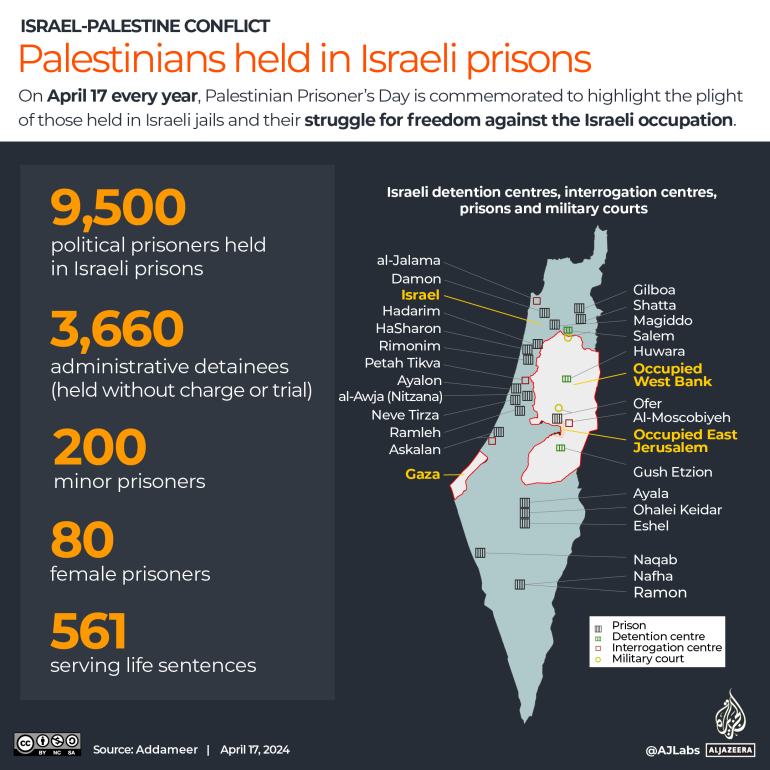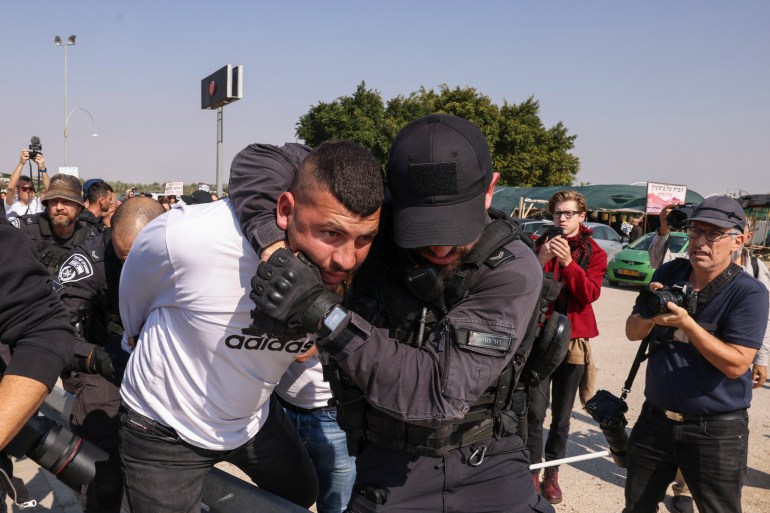In July 2020, the Israeli army stormed Birzeit University in the occupied West Bank and arrested Nada* while she was attending a cultural event.
She was accused of plotting “acts of terrorism” against Israeli forces and sentenced to 20 months in prison.
But Nada says she neither committed a crime nor engaged in acts of ‘‘resistance” that would provoke her arrest.
“If you are Palestinian then you are always living in danger,” Nada, 24, told Al Jazeera.
“You don’t have to do any acts of resistance. As a Palestinian, I’m always thinking that the occupation forces see us all as terrorists.”
‘Always a target’
As a former prisoner, Nada is paying tribute to the thousands of Palestinians languishing in Israeli jails on Palestinian Prisoner’s Day, a national day commemorated annually on April 17.
Local monitors say at least 9,500 Palestinians from the occupied West Bank are in captivity, a sharp uptick from the 5,200 who were in prison before Israel launched an assault on Gaza in response to an October 7 attack on Israeli communities and military outposts led by the Palestinian group Hamas.

Since then, Palestinians have been arrested for actions as innocuous as raising a Palestinian flag or social media posts expressing empathy with victims in Gaza, where more than 35,000 people have been killed in Israel’s devastating war.
“Surveillance on social media targets anyone showing sympathy with Gaza, which is considered incitement for violence or as support for a ‘terrorist organisation’,” said a member of local Palestinian monitor Addameer, who asked not to be identified for fear of reprisal.
Since October 7, thousands of former prisoners have been rearrested on “suspicion” they pose a threat to Israel, according to ex-captives and rights groups.
“They really are targeting people that have a history of security problems, or a record from before,” said the source from Addameer.
Israeli soldiers raided Nada’s house on November 7 to rearrest her, putting her under “administrative detention” – a measure inherited from the British colonial mandate that Israeli authorities use to hold Palestinians captive without charge or process indefinitely.
Palestinians in administrative detention have no information about their situation, not being told the charges against them or the ostensible evidence.
Like Amina Attawel’s husband, Ahmed Rafik Shahanee, 44, who spent 19 months in administrative detention in 2020-21.
Attawel is the mother of four small children and has mostly watched them grow up alone in the Palestinian town of Kfar Thulth.
With her husband in prison, she said, the army frequently raided her house and frightened her children, who also were forced to watch Israeli soldiers rearrest their father on October 23.
“Any person in Palestine that has been arrested once will always be targeted again,” Attawel, 35, told Al Jazeera.
In addition to his time in administrative detention, Shahanee was in captivity for 14 years for participating in the second Intifada in 2000 – in which tens of thousands of Palestinians demonstrated against Israel’s occupation and the failure of the internationally backed peace process.
“My husband has almost spent half his life in prison,” she added.
Those arrested and rearrested after October 7 were subjected to even more inhumane treatment than that faced by Palestinians in Israeli jails in the past.
Nada faced those same extremely harsh conditions during her second time in captivity. Blindfolded for long periods of each day, she was also prevented from going to the toilet or showering by guards who would insult her, calling her things like “dog”.
“They don’t treat you like a human being in prison. They treat you like an animal,” Nada told Al Jazeera.
No transparency
In December, Israel claimed to have 1,000 captives from Gaza, yet it has not disclosed their whereabouts or provided them with legal aid.
“They are being held incommunicado,” said Diana Buttu, a Palestinian lawyer and analyst.
The lack of transparency makes Buttu believe the real number of political prisoners from Gaza is higher than what Israel acknowledges.
“Human rights organisations have attempted to get the names and numbers [of prisoners] and their locations, but Israeli courts have said no.”
She noted that thousands of Palestinian workers from Gaza were swiftly arrested in Israel without charge after October 7.
Under international law, their arrests may qualify as enforced disappearances since Israel has not disclosed their fate or whereabouts to their loved ones.
“One person that I spoke to that was in one of the prison camps [in Israel], said there were about 2,000 people held there from Gaza. But again, we have no idea of their names, the conditions they are in, or where they are exactly,” Buttu said.

Palestinians from Gaza are also reportedly facing acute mistreatment and torture.
An Israeli doctor described horrific conditions Palestinian prisoners from Gaza were held under at a temporary detention facility, including being restrained at all times, blindfolded, fed through a straw and forced to urinate and defecate into diapers.
The use of plastic restraints fastened too tight often resulted in infections that have resulted in prisoners having to have their extremities amputated, the doctor told the Israeli attorney general and defence and health ministers.
The source from Addameer was not able to confirm these reports but said at least 27 detainees from Gaza have died in Israel.
“Some of the detainees we interviewed [in the facility where the Israeli doctor worked] confirmed that people died. But they didn’t know if it was because of health issues, or if they were injured from the war in Gaza and then not treated or what exactly was the circumstance,” the source said.
Families torn apart
At least 15 prisoners from the occupied West Bank have died since October 7 as well, according to the individual from Addameer, who added that Israeli authorities refuse to give families the bodies of their loved ones for a dignified burial.
“In all my 27 years in this field, I have never seen so many … people losing their lives inside the prisons,” the source said.
Attawel fears that her husband, still behind bars, could die in prison one day, too.
He recently complained to an Israeli judge about being beaten and starved, she said, but the judge silenced him.
She now worries that he could spend several more years in prison on trumped-up charges – or no charges at all.
“I have to be mother and father at once for my children,” she told Al Jazeera.
“But this is what I have to do. I can’t give up and I can’t tire. I have to continue to be there for my children through all the oppression.”
* Name changed to protect the individual from reprisals.
Read More: World News | Entertainment News | Celeb News
Aljazera









